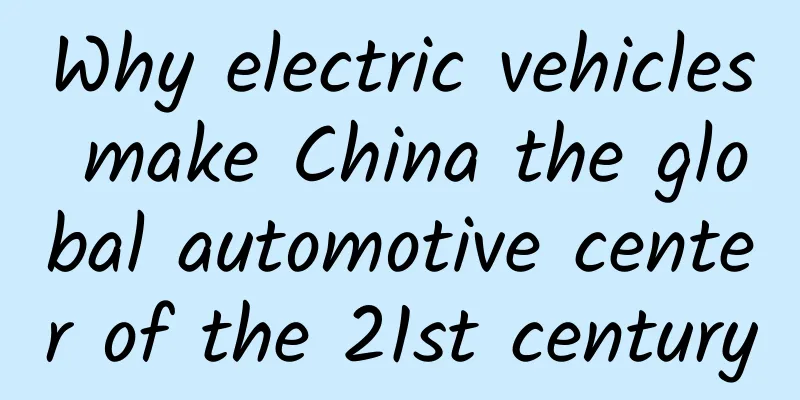Why electric vehicles make China the global automotive center of the 21st century

|
Globally, automakers and governments are making big plans for electric vehicles and raising billions of dollars to replace the world's gas-powered cars and trucks. But there's one country that's clearly leading the pack in terms of the number of electric cars on the road: China. What happened in China? Figure: Global electric vehicle sales are growing rapidly, with China in the lead Sales of new energy vehicles (NEVs), including plug-in hybrids, grew about 50% in 2017, while pure electric vehicle sales roughly doubled. Global electric vehicle sales exceeded 1 million for the first time, with China accounting for more than half the market and aiming to sell 7 million by 2025. Local brands include Geely and BYD, which is backed by U.S. billionaire investor Warren Buffett. Startup NIO is positioning itself as a top challenger to Elon Musk's Tesla electric car company. Why has there been such great progress? It's a key part of China's plan to reduce air pollution, a bottleneck for many of its cities. As a signatory to the 2015 Paris climate agreement, China pledged to reduce carbon emissions to combat climate change. A caveat: Two-thirds of China's grid is powered by coal, which itself produces pollution and carbon emissions. Chinese leaders want to reduce the country's heavy reliance on imported oil, seen as a strategic weakness. A plan released by the Chinese government last year envisions that new energy vehicles will make up all future gains in car sales in China. How did China do this? For automakers, China has adopted stricter vehicle emission regulations and quotas for the production of zero-emission or low-emission vehicles starting in 2019. For consumers, buying new energy vehicles can enjoy a 10% tax rebate and subsidies from provincial governments. China spent about $1 billion on subsidies in 2017, but is preparing to cancel them by 2020. What about automakers outside of China? They all have plans for non-gasoline cars. Volkswagen AG plans to spend 70 billion euros ($81 billion) to offer electric versions of all its models by 2030, with most of the spending going to battery costs. General Motors plans to launch 20 all-electric vehicles by 2023. Volvo AG will begin phasing out gasoline-powered cars in 2019. Tesla launched its first mid-range car, the Model 3, in mid-2017, though it has struggled to meet production targets. How much support do other governments give to electric vehicles? U.S. consumers get a $7,500 tax credit for buying electric cars, but the credit phases out when a company reaches 200,000 sales, as Tesla has done and is followed by Nissan Motor and General Motors. Other countries, including Norway, France and Britain, Germany and India, have or are discussing deadlines for ending sales of new cars with internal combustion engines. How dependent are electric vehicle sales on subsidies? There is ample evidence that electric vehicle sales are highly dependent on subsidies. In the United States, electric vehicle sales in Georgia were growing rapidly until the state cut its $5,000 tax credit in June 2015. After the incentive was removed, monthly sales of electric vehicles fell from 1,400 to less than 100. Even in environmentally conscious Denmark, sales fell 60% in early 2017 after the government announced it would phase out its tax exemption. Is this all about price? Not exactly. The limited range of electric vehicles is probably the most important factor in terms of barriers to adoption. However, the technology is improving. The extended range version of the Model 3 can travel 310 miles (about 500 kilometers) per charge. That's not much more than the cost of a gas car, but after half of the range, it takes about 30 minutes to charge an electric car on Tesla's most powerful charger. As for cost, Bloomberg New Energy Finance estimates that by 2025, the cost of electric vehicles will be comparable to that of gas cars. Can electric cars make China a global automotive hub? Given its sheer size and accumulating wealth, China looks certain to become the world's automotive center in the 21st century. The question is whether its companies can dominate as much as the Detroit Big Three did for much of the last century. China may be more successful in developing electric cars than it is in developing gasoline-powered vehicles, thanks to a more level playing field created by its nascent electric vehicle industry. South Korean manufacturers have already shown how to shake up the automotive market with high-quality, affordable products. As a winner of Toutiao's Qingyun Plan and Baijiahao's Bai+ Plan, the 2019 Baidu Digital Author of the Year, the Baijiahao's Most Popular Author in the Technology Field, the 2019 Sogou Technology and Culture Author, and the 2021 Baijiahao Quarterly Influential Creator, he has won many awards, including the 2013 Sohu Best Industry Media Person, the 2015 China New Media Entrepreneurship Competition Beijing Third Place, the 2015 Guangmang Experience Award, the 2015 China New Media Entrepreneurship Competition Finals Third Place, and the 2018 Baidu Dynamic Annual Powerful Celebrity. |
<<: Box trap? The hidden tricks in the large-screen advertising market that you don’t know about
>>: Security robot "commits suicide" - Is artificial intelligence a blessing or a curse for humans?
Recommend
Technology News | Self-reproducing living robot is launched
[Today's cover] On the 30th, Mount Tai after ...
It’s too late to drink coffee when you’re sleepy!
Coffee has always attracted much attention as a l...
The Leapmotor C11 suddenly caught fire on the street. Is this another car company that claims to have “zero spontaneous combustion” going back on its word?
As we enter the new energy era, netizens suddenly...
How to find the sun's "brothers and sisters"? These three conditions are indispensable!
Today is the Lesser Heat. Although it is not the ...
Can teeth be “printed”?
Do you still remember the stunning opening ceremo...
Kuaishou account cold start tips and operation guide!
How to cold start a new short video account is a ...
Face to face | Me and my fathers who made two bombs and one satellite
In the history museum of the Beijing No. 9 Resear...
Wuhan welcomes the first batch of college students returning to school, they are finally back! I really want to go to class!
On August 22, students from the Shouyi Campus of ...
What are the functions of the Guangzhou Amusement Park mini program? How much does it cost to develop a group buying app for a children’s playground?
The mini program has been online for more than 5 ...
KOL usage guide: 6 practical marketing experiences!
Where there are people, there is the world; where...
Uncle Wolf’s Zhihu Precision Traffic Drainage 9.0 Training Course
There are 21 videos in total of Uncle Wolf’s Zhih...
Just 2 steps to permanently turn off Win10 automatic updates
It's not that Windows 10 is bad, but Microsoft...
11 ways to increase product conversion rate!
Improving conversion rate is one of the core task...
Event Operations: Grasp these 5 points to increase online event participation
A popular online event can not only directly brin...
Do you like to eat cold dishes in summer? Be careful! Eating these vegetables raw can easily lead to parasite infection!
In the hot summer, the weather is getting hotter ...









